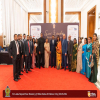
Good Morning, Ladies and Gentlemen. I would like to thank Dr. Ngozi and Ambassador Santiago for organizing this virtual meeting enabling me to present my country’s views on ongoing negotiations.
At the outset, Sri Lanka reaffirms its commitment to the mandates agreed at MC11 and under SGD 14.6, and to the collective achievement of a balanced, comprehensive and effective disciplines on fisheries subsidies, with appropriate and effective S and DT measures for developing countries.
Sri Lanka is therefore concerned that the present Chair’s text does not reflect the divergent positions of the developing countries, and fails to adequately address the agreed mandates, particularly on the critical issue of S and DT for developing countries.
The text, in fact, has regressed in terms of sustainability as well as development. Instead, the proposed design of disciplines and permanent flexibilities would legitimize the status quo, allowing the biggest polluters of global fishery resources to continue harmful practices. At the same time, it has narrowed the scope of S and DT provisions for developing countries. The resulting imbalance in the text may jeopardize its endorsement at MC 12.
That S and DT is of critical importance, is recognized in both the WTO and SDG14.6 mandates and in other international legal instruments that have underscored multifaceted purposes of S & DT for developing countries. Nevertheless, it is disheartening that it is frequently framed as a problematic part of these negotiations.
Current S and DT proposals mostly relate to exclusion from prohibitions for developing countries, only within their territorial seas. However, the additional exclusion of EEZs from prohibitions under all negotiating pillars, would allow developing countries to provide government support to build the capacity of the domestic fishing industry, leading to greater value addition of sovereign resources, and bolstering vulnerable communities.
The Chair's text takes a ‘sustainable’ management-based approach to curb subsidies, which, while allowing those having robust fisheries management systems to continue subsidisation, places those unable to demonstrate the effectiveness of their policies, at a disadvantageous position. The WTO must ensure that any commitments in these negotiations do not undermine existing frameworks for fisheries management.
If S and D T is to be “appropriate and effective”, developing countries must be allowed to manage and conserve their resources as per their international obligations. This approach would provide development flexibility, conservation integrity, be easier to administer as well as focus efforts on curbing subsidies in high-seas.
As such, S and D T should not only be about keeping a lifeline for some artisanal fisheries, but it should offer a set of supplementary disciplines that are consistent with provisions in international legal instruments, as well as entail flexibilities for future policy space which act as synergies.
I thank you.








